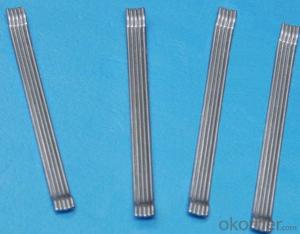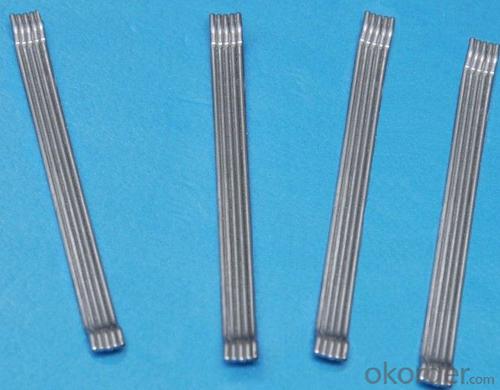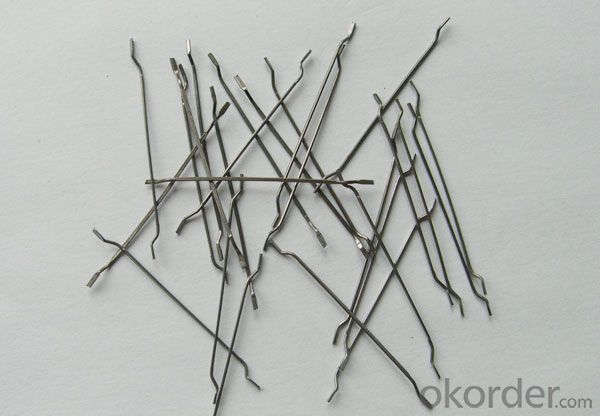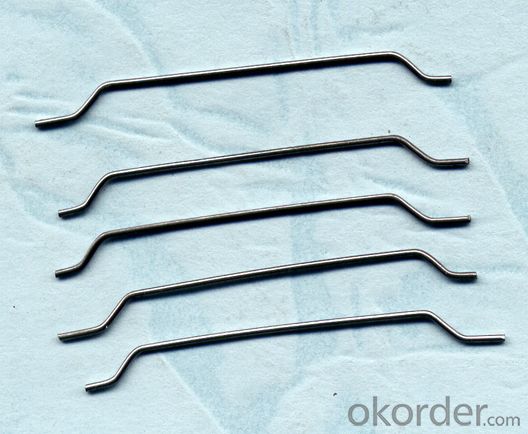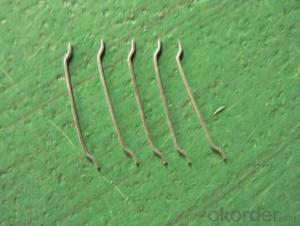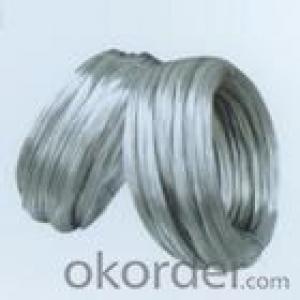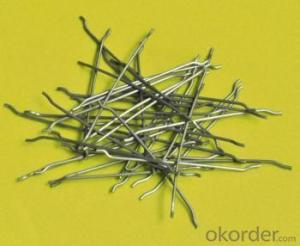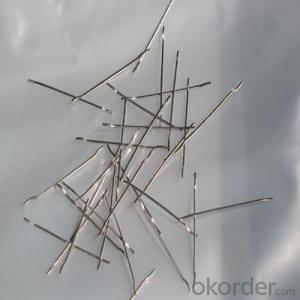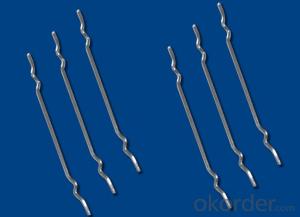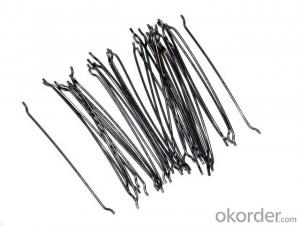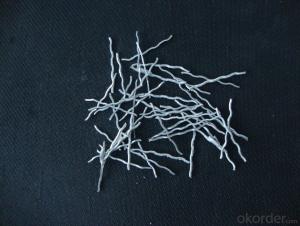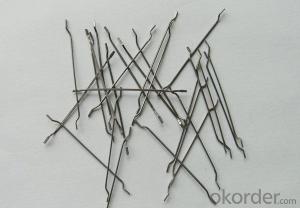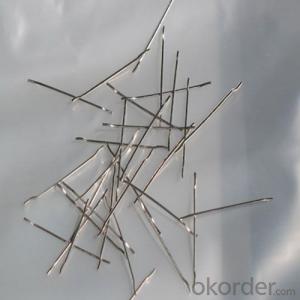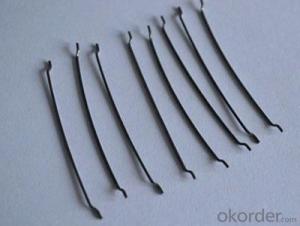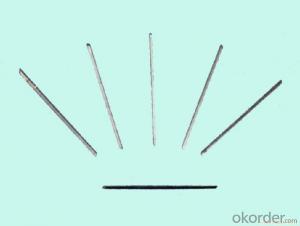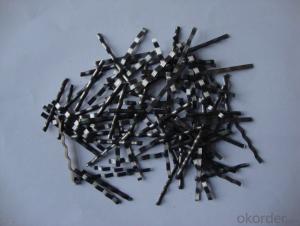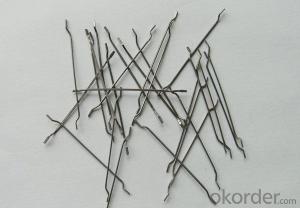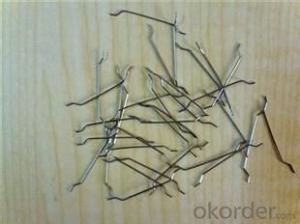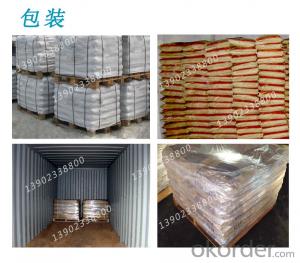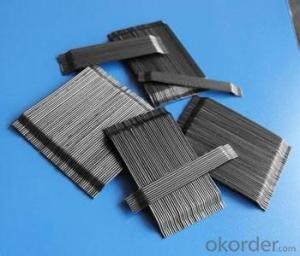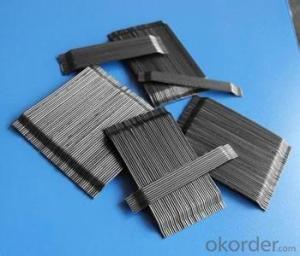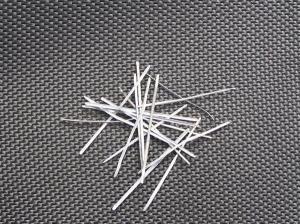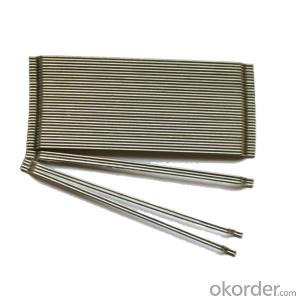Melt Extract Stainless Steel Fiber - Straight Type CNBM International from China
- Loading Port:
- Tianjin
- Payment Terms:
- TT OR LC
- Min Order Qty:
- 1000 kg
- Supply Capability:
- 30000 kg/month
OKorder Service Pledge
OKorder Financial Service
You Might Also Like
Quick Details
Place of Origin: Jiangsu, China (Mainland)
Model Number: HT-ST
Material: Steel
Specifications
1.Diameter:0.4mm-1.2mm
2.Length: 25mm-60mm
3.Material: low carbon steel wire
4.Feature: excellent tensile,high tenacity,against cracking,impact and fatigue
5.Uses: highway,tunnel,building,airport road serface and so on .
Steel Fiber Specification :
MODEL | DIAMETE(mm) | LENGTH(mm) | ASPECTRATIO(mm) | TENSILE STRENGTH(Mpa) |
YS-60/60 | 1 | 60 | 60 | ≥1000Mpa |
YS-50/50 | 1 | 50 | 50 | ≥1000Mpa |
YS-65/60 | 0.9 | 60 | 65 | ≥1000Mpa |
YS-55/50 | 0.9 | 50 | 55 | ≥1000Mpa |
YS-80/60 | 0.75 | 60 | 80 | ≥1000Mpa |
YS-45/35 | 0.75 | 35 | 45 | ≥1000Mpa |
YS-55/30 | 0.55 | 30 | 55 | ≥1000Mpa |
YS-60/30 | 0.5 | 30 | 60 | ≥1000Mpa |
YS-50/25 | 0.5 | 25 | 50 | ≥1000Mpa |
YS-60/25 | 0.4 | 25 | 60 | ≥1000Mpa |
Picture
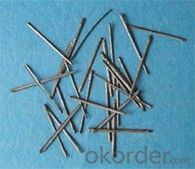
Steel fiber straight type
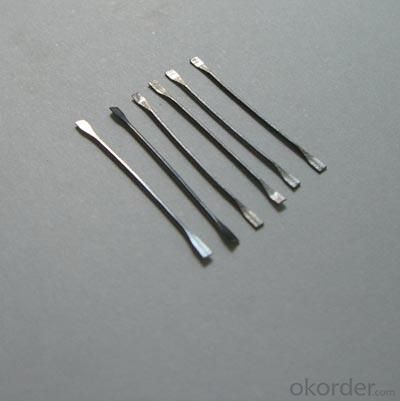
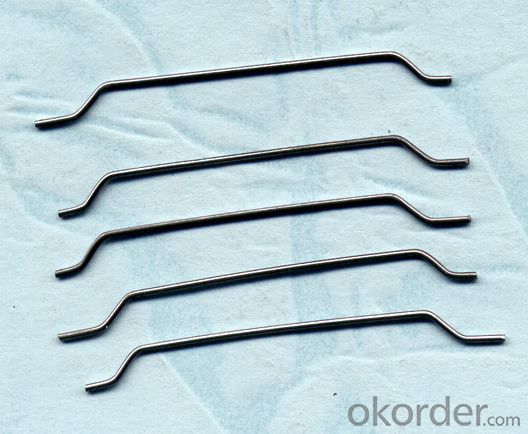
FAQ
certificated: ISO 9001
Technical advantages of Daye steel fiber:
A. Improve mechanical performance of concrete
B. Provide uniform distribution throughout concrete with excellent mixing
C. No balling or caking by adopt correct mixing method
D. Reduce concrete volume
E.Save construction time and cost
F.Reduce excavation volume
G.Available for jointless floor.
- Q: How does melt extract stainless steel fiber improve the crack resistance of concrete?
- The crack resistance of concrete is enhanced by melt extract stainless steel fiber in several ways. To begin with, the inclusion of stainless steel fibers in the concrete mix helps to evenly distribute stresses throughout the entire structure. These fibers form a three-dimensional network within the concrete, reinforcing it and preventing cracks from spreading while also improving the efficiency of applied loads. Furthermore, the crack resistance of concrete is improved by the high tensile strength and ductility of stainless steel fibers. These fibers possess exceptional mechanical properties that enable them to absorb and dissipate energy when exposed to external forces or changes in temperature. Consequently, they provide greater resistance to cracking caused by shrinkage, temperature fluctuations, and external loads. Another important factor is the capability of stainless steel fibers to control crack width and limit its propagation. Acting as small bridges across cracks, these fibers reduce their width and prevent them from expanding further. This limitation of crack width ensures the integrity and longevity of the concrete structure. Additionally, stainless steel fibers enhance the flexural strength and toughness of concrete. This increased flexural performance enables the concrete to withstand higher bending stresses and deformations without cracking. Consequently, it enhances the overall crack resistance of the concrete, making it more resistant to initial and subsequent cracking under load. In summary, the addition of melt extract stainless steel fiber significantly improves the crack resistance of concrete by establishing a reinforcing network, absorbing energy, controlling crack width, and enhancing flexural strength and toughness. These combined effects result in a more durable and reliable concrete structure, with reduced cracking and increased resistance to various external factors.
- Q: How does the addition of melt extract stainless steel fiber affect the setting time of concrete?
- The addition of melt extract stainless steel fiber can affect the setting time of concrete in a few ways. Firstly, the stainless steel fibers can act as nucleation sites for the formation of hydration products, which can accelerate the setting time of concrete. This is because the stainless steel fibers provide additional surface area for the hydration reactions to occur, leading to faster cement hydration and setting. Secondly, the stainless steel fibers can also improve the overall mechanical properties of the concrete, such as its tensile strength and crack resistance. This can indirectly affect the setting time of concrete by reducing the need for extended curing periods. With improved mechanical properties, the concrete can reach its desired strength faster, allowing for shorter setting times. However, it is important to note that the addition of melt extract stainless steel fiber should be carefully controlled to avoid any negative effects on the setting time of concrete. Excessive amounts of fibers can hinder the flowability of the concrete mixture, leading to longer setting times. Therefore, it is crucial to find the right dosage of stainless steel fibers to achieve the desired setting time and mechanical properties of the concrete. Additionally, the specific characteristics of the stainless steel fibers, such as their length and aspect ratio, can also influence the setting time of concrete and should be taken into consideration during the design and mixing process.
- Q: Can melt extract stainless steel fiber be used in high-strength shotcrete applications?
- Yes, melt extract stainless steel fiber can be used in high-strength shotcrete applications. This type of fiber provides enhanced strength and durability to the shotcrete, making it suitable for demanding applications that require high-strength materials.
- Q: How does the addition of melt extract stainless steel fiber impact the shrinkage of concrete?
- The addition of melt extract stainless steel fiber can have a significant impact on the shrinkage of concrete. Stainless steel fibers are added to concrete to enhance its strength, durability, and crack resistance. When these fibers are incorporated into the concrete mix, they provide reinforcement and reduce the overall shrinkage of the material. Concrete shrinkage is a natural phenomenon that occurs as the material dries and loses moisture. This shrinkage can lead to the development of cracks, which can compromise the integrity and longevity of the concrete structure. However, by adding melt extract stainless steel fibers, the shrinkage is mitigated, and the potential for cracks is greatly reduced. The stainless steel fibers work by creating a three-dimensional network within the concrete matrix. As the concrete shrinks, the fibers resist the tensile forces that develop, preventing the formation of cracks. The fibers act as reinforcement, distributing the stress throughout the material and improving its overall performance. Furthermore, the addition of melt extract stainless steel fibers can also enhance the post-cracking behavior of concrete. In the event that cracks do occur, the fibers provide bridging reinforcement across the cracks, preventing them from propagating further and improving the structural integrity of the concrete. Overall, the addition of melt extract stainless steel fibers to concrete results in a significant reduction in shrinkage and an improvement in crack resistance. This not only enhances the durability and longevity of the concrete structure but also ensures its ability to withstand external forces and environmental conditions.
- Q: What is the recommended curing regime when using melt extract stainless steel fiber in concrete?
- When utilizing melt extract stainless steel fiber in concrete, it is generally advised to adhere to a curing regimen similar to regular concrete. This entails maintaining a consistent temperature and keeping the concrete moist for a specific duration to facilitate proper hydration and curing. To be more precise, it is typically recommended to follow the curing guidelines provided by the American Concrete Institute (ACI). These guidelines advocate for an initial period of moist curing lasting at least 7 days. During this time, the concrete should be kept moist by either continuous spraying or covering it with damp burlap, plastic sheeting, or similar materials. This practice serves to prevent moisture loss and promote optimal curing. Following the initial moist curing stage, it is advisable to continue the curing process for an additional minimum period of 14 days. This can be achieved by either maintaining moisture in the concrete or by employing a curing compound. Curing compounds are liquid coatings that are applied to the surface of the concrete, forming a protective barrier that prevents moisture loss. By creating this barrier, these compounds aid in retaining moisture within the concrete, thus facilitating proper curing. It is important to bear in mind that the specific curing regimen may differ depending on project requirements, environmental conditions, and the recommendations provided by the manufacturer of the melt extract stainless steel fiber used in the concrete. Therefore, it is always prudent to consult the manufacturer's technical data sheets or seek guidance from experienced professionals to ensure the correct curing regimen is followed for optimal performance of the concrete incorporating melt extract stainless steel fiber.
- Q: How does melt extract stainless steel fiber improve the resistance to fire in concrete?
- Melt extract stainless steel fiber improves the resistance to fire in concrete by enhancing its ability to withstand high temperatures. The fibers act as reinforcement within the concrete matrix, preventing cracks and spalling during exposure to fire. They also help to dissipate heat more evenly throughout the concrete, reducing the risk of localized thermal stress. This ultimately improves the structural integrity and fire resistance of the concrete, making it a more reliable and durable material in fire-prone environments.
- Q: How does melt extract stainless steel fiber contribute to the crack width control of concrete?
- The control of crack width in concrete is significantly influenced by the use of melt extract stainless steel fiber. This particular type of fiber is created through the process of melting stainless steel and rapidly extracting it, resulting in the formation of a material that is both strong and flexible. When incorporated into concrete mixes, these fibers enhance the material's tensile strength and flexibility, thus aiding in the control of crack width. As the concrete cures, it undergoes shrinkage due to the evaporation of water. This shrinkage can lead to the development of cracks, which have the potential to compromise the structural integrity of the concrete. However, by adding melt extract stainless steel fibers to the concrete mix, these fibers act as reinforcement, effectively bridging any cracks that may form. The high tensile strength exhibited by stainless steel fibers enables them to withstand the forces that cause cracks to widen. In instances where cracks do occur, the fibers distribute stress and prevent the cracks from expanding, thereby controlling the width of the cracks. This prevents the cracks from enlarging and potentially resulting in structural failure. Additionally, the ductility of stainless steel fibers allows them to deform without fracturing. This means that the fibers can absorb energy and accommodate movements within the concrete, thus reducing the likelihood of cracks widening. The combination of high strength and ductility offered by melt extract stainless steel fibers makes them an efficient solution for the control of crack width in concrete. To summarize, melt extract stainless steel fibers play a crucial role in controlling crack width in concrete by reinforcing the material, distributing stress, and preventing cracks from widening. Their excellent tensile strength and flexibility make them an ideal choice for enhancing the overall durability and lifespan of concrete structures.
- Q: What is the effect of melt extract stainless steel fiber on the creep behavior of concrete?
- Melt extract stainless steel fiber has a positive effect on the creep behavior of concrete. The addition of these fibers helps to reduce the amount of creep deformation, thus improving the overall strength and durability of the concrete. The fibers enhance the tensile strength of the concrete, limiting cracking and preventing long-term deformation under sustained loads. Consequently, the presence of melt extract stainless steel fibers can significantly increase the creep resistance of concrete structures.
- Q: Can melt extract stainless steel fiber be used in fiber-reinforced shotcrete?
- Fiber-reinforced shotcrete can indeed incorporate melt extract stainless steel fiber. Shotcrete applications commonly utilize stainless steel fibers due to their impressive tensile strength, resistance to corrosion, and overall durability. The melt extract process guarantees consistent and uniform fiber properties, rendering it an ideal choice for reinforcing shotcrete. The inclusion of stainless steel fibers in shotcrete greatly enhances its mechanical properties, including flexural and impact strength, crack resistance, and ductility. As a result, the overall performance and lifespan of the shotcrete structure are significantly improved. However, it is crucial to consider the specific requirements of the application, fiber dosage, and mix design to ensure the appropriate and effective utilization of stainless steel fibers in fiber-reinforced shotcrete.
- Q: How does melt extract stainless steel fiber improve the abrasion resistance of concrete?
- Melt extract stainless steel fiber improves the abrasion resistance of concrete by reinforcing the matrix and enhancing its durability. The addition of stainless steel fibers creates a three-dimensional network within the concrete, which helps to distribute the applied load and reduce cracking. This network also acts as a barrier against abrasive forces, preventing the concrete from wearing out quickly. Overall, the incorporation of melt extract stainless steel fiber strengthens the concrete and enhances its ability to withstand abrasion, leading to increased longevity and performance.
Send your message to us
Melt Extract Stainless Steel Fiber - Straight Type CNBM International from China
- Loading Port:
- Tianjin
- Payment Terms:
- TT OR LC
- Min Order Qty:
- 1000 kg
- Supply Capability:
- 30000 kg/month
OKorder Service Pledge
OKorder Financial Service
Similar products
Hot products
Hot Searches
Related keywords
